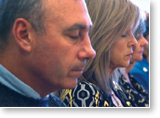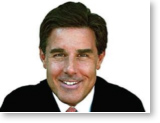 Here are excerpts from Peter Cohan’s recent column in Forbes about the Transcendental Meditation program and the spiritual entrepreneur.
Here are excerpts from Peter Cohan’s recent column in Forbes about the Transcendental Meditation program and the spiritual entrepreneur.
_____________________________
Peter Cohan, March 26th, 2012

Oprah Winfrey devoted her OWN show Sunday night to Transcendental Meditation (TM). But TM is not just for Oprah, it can help start-ups too.
Dr. Sharda S. Nandram
At least that was the claim of Dr. Sharda S. Nandram, Professor in Entrepreneurship at the University of Applied Sciences HAN, Associate Professor Entrepreneurship at Nyenrode Business University, and founder of Praan Solutions.
On March 21st, Nandram and I debated ”The Future of Entrepreneurship: Hungry start-upper vs Spiritual Entrepreneur” at EADA, a Barcelona business school. Nandram cited research in her talk that companies whose employees do TM have higher productivity.
Before getting into her remarks and my comments on them, it’s worth discussing what TM is and why it might help companies.
David Lynch
Twin Peaks director, David Lynch, is a fan and he claims that it turned him from an angry man into a happy one. As he told the Seattle Times, “I was filled with an anger and sorrows and doubts and melancholy. And I took it out on my first wife. I made her life pretty much a hell. So I start Transcendental Meditation, and two weeks later she comes to me and says, ‘What is going on? This anger, where did it go?’”
The answer, it turned out, was TM. And for Lynch, his sister convinced him to take up the practice. According to Lynch, “One day my sister called, and she said she started TM, and I heard a change in her voice — more happiness, more self-assuredness. And I said, ‘This is what I want.’ Things lift away so naturally.”
For Nandram, start-ups benefit from TM specifically, and spirituality in general. Her talk on “spirituality and entrepreneurship” reflects her efforts to “see the person behind the entrepreneurs.” And she thinks “it is time to deepen the ‘inner box’, one may call intuition, reflective zone, inner sense, the area of mindfulness or authentic self.”
When my host, EADA professor Manuel Marin, asked me what I thought of the idea of spirituality and entrepreneurship my first thought was that I do not know what Nandram means by spirituality; however, I see two areas where things that might be related to spirituality factor into start-up strategy.
Manuel Marín
The first many entrepreneurs start companies not for money but to change the world. If entrepreneurs’ visions of what that world would look like end up improving life for other people, those start-up CEOs are using a kind of spirituality to attract and motivate top talent.
Furthermore, when entrepreneurs hire those people, they look for integrity. As I described in my book, Value Leadership, integrity means that people do what they say they will do. And in a start-up, integrity has a compelling business imperative — there is no time or money for people who can’t be trusted.
Peter Cohan
So I would argue that depending on your definition, start-ups that want to make the world a better place and hire people with integrity, do benefit from spirituality.
Moreover, if others get the benefits that David Lynch claims for TM, it’s worth investigating the notion that TM’s practice among a start-up’s employees could allow them to focus more on the task at hand, reduce their level of anger and distraction, and boost their productivity.
If such spirituality is good for business, bring it on.
________________________________________________________________

To read Peter Cohan’s full story in Forbes, CLICK HERE.
________________________________________________________________







